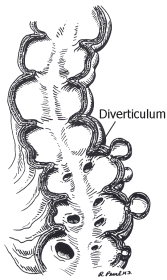|
||||||||||
|
|
||
| Diverticular disease of the colon is a common
condition that afflicts about 50% of Americans
by age 60 and nearly all by age 80. Only
a small percentage of those with diverticula
of the colon have symptoms, and even fewer
will ever repuire surgery. ¡ WHAT IS DEVERTICULITIS? Diverticula are pockets or pouches that develop through weaknesses in the colon wall, usually in the sigmoid or left colon, but may involve the entire colon. Diverticulitis describes perforation or inflammation of the diverticulum. |
||
| ¥WHAT ARE THE SYMPTOMS? The major symptoms of diverticular disease are abdominal pain (usually in the lower left abdomen) , diarrhea, cramps, alteration of bowel habit and, occasionally, severe rectal bleeding. These symptoms occur in a small percentage of patients with diverticulosis and are sometimes difficult to distinguish from other intestinal disorders such as irritable bowel syndrome. Diverticulitis -an inflammation or infection of a diverticulum- may cause one or more of the following symptoms: pain, chills, fever, and change in bowel habits. Severe cases of diverticulitis may be complicated by infections in the abdoman, drainage tracts to the bladder or vagina, or bursting of the colon requiring emergency operation. |
||
| ¥WHAT IS THE CAUSE OF DIVERTICULAR DISEASE? Indications are that a low-fiber diet over many years creates increased colon pressure and results in the development of diverticula. |
||
¥HOW IS DIVERTICULAR DISEASE TREATED? Mild symptoms of diverticular disease are
usually treated by diet and occasionally
medications to help control pain, cramps
and changes in bowel habits. Increasing the
amount of dietary fiber (grains, legumes,
vegetables, etc) and sometimes restricting
certain foods reduces pressure in the colon
so that complications are less likely to
arise. Mild symptoms of diverticular disease are
usually treated by diet and occasionally
medications to help control pain, cramps
and changes in bowel habits. Increasing the
amount of dietary fiber (grains, legumes,
vegetables, etc) and sometimes restricting
certain foods reduces pressure in the colon
so that complications are less likely to
arise.Diverticulitis requires more intense managment. Mild cases may be managed without hospitalization, but this is a decision best made by your physician.Treatment usually consists of oral antibiotics, dietary restrictions and possibly stool softeners. Severe cases require hospitalization with intravenous antibiotics and strict dietary restraints. Most acute attacks can be relieved with such methods. |
||
| ¥WHEN IS SURGERY NECESSARY? Suegery is indicatded for recurrent episodes, complications or severe attacks when there is little or no response to medication. In surgery, usually part of the colon -commonly the left or sigmoid colon- is removed and the colon is reconnected or ganastomosedh to the rectum.Complete recovery can be expected. Normal bowel function usually resumes in 1-3 weeks. |
||
| ¥WHO PERFORMS THIS TYPE OF SURGERY? Colon and rectal surgeons are experts in the surgical and nonsurgical treatment of colon and rectal problems. They have completed advanced training in the treatment of colon and rectal problems in addition to full training in general surgery. Colon and rectal surgeons treat benign and malignant conditions, perform routine screening examinations and treat problems surgically when necessary. |
||
| ¥WHAT IS A COLON AND RECTAL SURGEON? Colon and rectal surgeons are experts in the surgical and nonsurgical treatment of colon and rectal problems. They have completed advenced training in the treatment of colon and rectal problems in addition to full training in general surgery. Colon and rectal surgeons treat benign and malignant conditions , perform routine screening examinations and surgically treat problems when necessary. |
||
| give an authority GASCRS |
